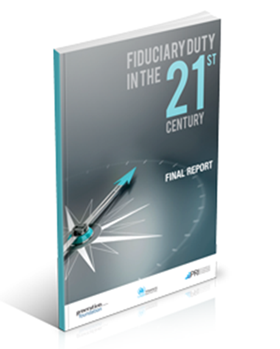Investors are required to incorporate material risks, including relevant ESG issues, into investment practice and decision-making in pursuit of financial returns for beneficiaries and clients.
As mounting sustainability risks undermine longer term value creation, the Legal Framework for Impact research report addresses new fundamental legal questions about how investors should consider acting on sustainability challenges posed by the economic transition. The report findings show that “while financial return is generally regarded as the primary purpose and goal of investors, investors are likely to have a legal obligation to consider pursuing sustainability impact goals where doing so can contribute to achieving their investment objectives.”
The journey so far
2005: Establishing legal permission for ESG integration
A legal framework for the integration of ESG issues into institutional investment
In the 2000s, investors began to understand the importance of ESG factors for their investment decisions. This was best articulated by the 2005 Freshfields report, A legal framework for the integration of ESG issues into institutional investment, which found that investors are permitted incorporate financially material ESG issues as part of their fiduciary duties. This report led in part to the launch of the PRI in 2006.
2015: Building momentum for regulatory expectations
Fiduciary Duty in the 21st Century
Despite growing awareness of responsible investment, there remained an implementation gap, with capital markets often not accounting for the sustainability-related risks and opportunities.
In 2016, the PRI, UNEP FI and The Generation Foundation launched a four-year project culminating in the Fiduciary Duty in the 21st Century final report. It determined that incorporating ESG issues is a requirement of fiduciary duties, given the financial materiality of ESG issues.
Financial regulators in the EU, UK, South Africa, Brazil and Ontario began to clarify regulatory requirements related to the consideration of relevant environmental, social, and governance factors in investment decision making and disclosures.
The Fiduciary Duty in the 21st Century report
- “Failing to Consider long-term investment value drivers, which include environmental, social and governance issues, in investment practice is a failure of fiduciary duty”
- “Despite significant progress, many investors have yet to fully integrate environmental, social and governance issues into their investment decision-making process”
- “Integrating ESG issues into investment research and processes will enable investors to make better investment decisions and improve investment performance consistent with their fiduciary duties”
2021: Pursuing positive sustainability impact
A Legal Framework for Impact
While the debate about whether fiduciary duty requires investors to integrate material ESG issues in their investment decisions is now settled, fundamental legal questions about the pursuit of better real-world sustainability outcomes remained unanswered:
- Are there legal impediments to investors adopting ‘impact targets’ - for example - that an investor’s investment activity is consistent with no more than 1.5 degrees of warming?
- Are investors legally required to integrate the sustainability impacts of their investment activity in their decision-making processes?
- On what positive legal grounds could or should investors integrate sustainability goals like the achievement of the Paris Agreement goals or the SDGs in their investment decision-making?
In October 2019, The Generation Foundation, UNEP FI and the PRI appointed the leading law firm, Freshfields, to analyse whether and how legal frameworks allow for investors to consider sustainability impact across 11 jurisdictions: Australia, Brazil, Canada, China, European Union, France, Japan, Netherlands, South Africa, United Kingdom and United States.
In 2021 A Legal Framework for Impact was published. The findings set out in this report establish that investors will likely be required to consider setting and pursuing real-world sustainability impact goals where doing so can be effective in achieving their financial goals.
Rather than superseding the Fiduciary Duty in the 21st Century report, A Legal Framework for Impact builds on that work by seeking answers to these additional questions about real-world sustainability impacts.
A Legal Framework for Impact report
-
While financial return is generally regarded as the primary purpose and goal of investors, investors are likely to have a legal obligation to consider pursuing sustainability impact goals where doing so can contribute to achieving their investment objectives.
-
Pursuing sustainability impact goals does not mean deprioritising an investor’s financial purpose and objectives. On the contrary, in some cases investors need to address sustainability impacts in order to protect or enhance financial returns.
NB: this article was updated on 10/04/2025.













